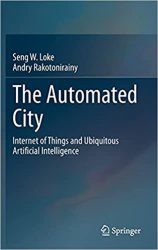The Automated City: Internet of Things and Ubiquitous Artificial Intelligence
- Добавил: literator
- Дата: 9-09-2021, 19:49
- Комментариев: 0
 Название: The Automated City: Internet of Things and Ubiquitous Artificial Intelligence
Название: The Automated City: Internet of Things and Ubiquitous Artificial IntelligenceАвтор: Seng W. Loke, Andry Rakotonirainy
Издательство: Springer
Год: 2021
Страниц: 176
Язык: английский
Формат: pdf (true), epub
Размер: 10.6 MB
The book outlines the concept of the Automated City, in the context of smart city research and development. While there have been many other perspectives on the smart city such as the participatory city and the data-centric city, this book focuses on automation for the smart city based on current and emerging technologies such as the Internet of Things, Artificial Intelligence (AI) and Robotics. The book attempts to provide a balanced view, outlining the promises and potential of the Automated City as well as the perils and challenges of widespread automation in the city.
The book discusses, at some depth, automated vehicles, urban robots and urban drones as emerging technologies that will automate many aspects of city life and operation, drawing on current work and research literature. The book also considers broader perspectives of the future city, in the context of automation in the smart city, including aspirational visions of cities, transportation, new business models, and socio-technological challenges, from urban edge computing, ethics of the Automated City and smart devices, to large scale cooperating autonomous systems in the city.
The Internet of Things is the interconnection of endpoints (devices and things) which can be uniquely addressed and identified with an IP (Internet Protocol) address. With the Internet of Things, devices can be connected to the Internet, sense, gather, receive and send data and communicate with each other and applications via IP technologies, platforms and connectivity solutions. But wide-area Internet is not the only way to connect things, various types of shorter range wireless networking technologies have enabled things to connect with other things (and eventually to the Internet), even within shorter ranges, allowing not only wide-area but local machine-to-machine communications and cooperation. There is also a range of protocols developed for the Internet of Things, with a focus on machine-to-machine communications, not just for human communications, e.g., LoRaWAN, NB-IoT, LTE-M, MQTT, LwM2M,87 and so on. Web protocols and standards have also been integrated with the Internet of Things, forming the so-called Web of Things.
AI technologies, being data-driven, can automate transactions, make predictions, perform repetitive tasks and perform adaptations automatically. Artificial Intelligence can help to augment human capabilities in three ways:
• amplify: AI technologies, or data analytics, can find new insights from a large amount of data that may be hard for humans to discover, or expand the range of considered designs or options for a given problem;
• interact: AI can help facilitate interactions with people, or acts as agents to interact on behalf of people;
• embody: AI algorithms when combined with sensors and actuators and embedded in the physical world can assist humans with physical world tasks that are beyond ordinary human capabilities.
Contents:
1. An Overview of Technology Trends Towards Smarter Cities
2. The Automated City: Concept and Metaphors
3. Automated Vehicles, Urban Robots and Drones: Three Elements of the Automated City
4. The Future of the Automated City: Social, Technical and Ethical Perspectives
5. Conclusion
Скачать The Automated City: Internet of Things and Ubiquitous Artificial Intelligence
[related-news] [/related-news]
Внимание
Уважаемый посетитель, Вы зашли на сайт как незарегистрированный пользователь.
Мы рекомендуем Вам зарегистрироваться либо войти на сайт под своим именем.
Уважаемый посетитель, Вы зашли на сайт как незарегистрированный пользователь.
Мы рекомендуем Вам зарегистрироваться либо войти на сайт под своим именем.
